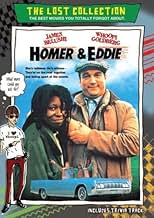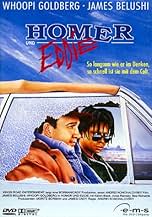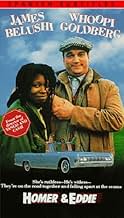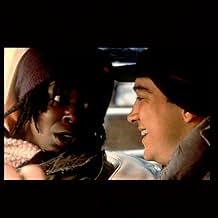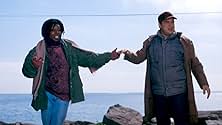AVALIAÇÃO DA IMDb
5,3/10
2,1 mil
SUA AVALIAÇÃO
Adicionar um enredo no seu idiomaA mentally disabled man gets help from a sociopath when he tries to reunite with his dying father, who years earlier disowned him.A mentally disabled man gets help from a sociopath when he tries to reunite with his dying father, who years earlier disowned him.A mentally disabled man gets help from a sociopath when he tries to reunite with his dying father, who years earlier disowned him.
- Prêmios
- 1 vitória e 1 indicação no total
Jim Belushi
- Homer Lanza
- (as James Belushi)
Jeff Thiel
- Twin #2
- (as Jeffrey Thiel)
Avaliações em destaque
OK, first thing: this movie is NOT a comedy, not by a long shot. It has funny parts, but it is not a comedy.
This is the best piece of acting you'll ever see from James Belushi and also one of Whoopi Goldberg's finest, unarguably.
The movie is touching, funny, sad, violent and breathtaking. So for anyone who hasn't seen it, see it!
This is the best piece of acting you'll ever see from James Belushi and also one of Whoopi Goldberg's finest, unarguably.
The movie is touching, funny, sad, violent and breathtaking. So for anyone who hasn't seen it, see it!
Though it has been years since I have seen this movie, I remember it with affection and feel compelled to counter the sweeping dismissals of many reviews.
In the bone-hard truth of the desert, humanity is stripped down to persistence, interdependence, and hope and faith in the absence of a visible destination. The road is a trajectory for self-recognition, catharsis, and redemption. And so, just as the desert surprises us with life in the most unexpected places, Homer and Eddie surprise themselves.
Homer and Eddie are not that unlikely a couple. Neither has anywhere to go, figuratively or literally; so they keep on going. Neither has a future to look forward to, and yet each of them harbors hope. They do so because they are still alive, and moving and hoping are as basic to life as breathing. They did not choose each other's company, and they are no less prejudiced towards others for their own low station in society.
Though a road movie, `Homer and Eddie' it is not of the usual sort. Violence here is not redeemed by a `good cause' or an undercurrent of sex appeal; vile speech is not tempered by youth or good looks; and there is no romantic involvement to offer distraction. Homer and Eddie are not Thelma and Louise. They have more in common with Lennie and George in `Of Mice and Men', or with Josué and Dora in `Central Station'. Sidelined by society for crime, poverty, terminal disease and mental disability, Homer and Eddie begin their companionship by default. Eddie reluctantly looks after Homer, like a parent after a stranger's child. As she takes on responsibility for someone more helpless than herself, Eddie senses a reawakening of her capacity to care (in every sense) for another human being and, implicitly, for herself. By defending Homer's human dignity, she recovers her own. Though it will not avert her fate, the experience restores Eddie's humanity.
I found the film empowering because it takes its protagonists and their situation seriously. Homer and Eddie are not innocent. Nor are their shortcomings dismissible as picturesque, colorful, or cute. They don't try to be lovable; they simply are who they are. Their humor is that of people who believe they have nothing to lose. The film's perspective is level and from the inside out, not from the lofty perch of mainstream society. In that sense, it isn't judgmental, either, and so allows us to empathize with its outcasts. Their heroism is in their refusal to be victims, and in rising above their situation against all odds. This quiet and remarkably subtle piece is some of the best I have seen of Hollywood, and the tears I cried were those of joy and relief: No matter how low you sink in life, it is never too late to be a worthy human being.
In the bone-hard truth of the desert, humanity is stripped down to persistence, interdependence, and hope and faith in the absence of a visible destination. The road is a trajectory for self-recognition, catharsis, and redemption. And so, just as the desert surprises us with life in the most unexpected places, Homer and Eddie surprise themselves.
Homer and Eddie are not that unlikely a couple. Neither has anywhere to go, figuratively or literally; so they keep on going. Neither has a future to look forward to, and yet each of them harbors hope. They do so because they are still alive, and moving and hoping are as basic to life as breathing. They did not choose each other's company, and they are no less prejudiced towards others for their own low station in society.
Though a road movie, `Homer and Eddie' it is not of the usual sort. Violence here is not redeemed by a `good cause' or an undercurrent of sex appeal; vile speech is not tempered by youth or good looks; and there is no romantic involvement to offer distraction. Homer and Eddie are not Thelma and Louise. They have more in common with Lennie and George in `Of Mice and Men', or with Josué and Dora in `Central Station'. Sidelined by society for crime, poverty, terminal disease and mental disability, Homer and Eddie begin their companionship by default. Eddie reluctantly looks after Homer, like a parent after a stranger's child. As she takes on responsibility for someone more helpless than herself, Eddie senses a reawakening of her capacity to care (in every sense) for another human being and, implicitly, for herself. By defending Homer's human dignity, she recovers her own. Though it will not avert her fate, the experience restores Eddie's humanity.
I found the film empowering because it takes its protagonists and their situation seriously. Homer and Eddie are not innocent. Nor are their shortcomings dismissible as picturesque, colorful, or cute. They don't try to be lovable; they simply are who they are. Their humor is that of people who believe they have nothing to lose. The film's perspective is level and from the inside out, not from the lofty perch of mainstream society. In that sense, it isn't judgmental, either, and so allows us to empathize with its outcasts. Their heroism is in their refusal to be victims, and in rising above their situation against all odds. This quiet and remarkably subtle piece is some of the best I have seen of Hollywood, and the tears I cried were those of joy and relief: No matter how low you sink in life, it is never too late to be a worthy human being.
Let's see: a foul mouthed, violent murderer, thief, escaped mental patient dying from an inoperable brain tumor (Goldberg)is driving a witless, infantile, drooling wanderer who has severe and permanent brain damage (Belushi) home to see his ashamed, abusive father who completely disowned him years earlier. Sounds like a fun road trip picture, doesn't it?
Not even close. This movie was so vile that most theater chains passed on it, and those that didn't yanked it from their screens in less than a week.
It is not funny, even in the context of a black comedy. It is violent, disturbing, foul and completely off the entertainment meter in the negative values. I have yet to see this on any retail or rental shelf, or any cable or TV station, even during the graveyard hell populated by Psychic Fraud Network and Ronco Commercials.
Don't hitch a ride with these two. Your sense of humor may be permanently hijacked.
Not even close. This movie was so vile that most theater chains passed on it, and those that didn't yanked it from their screens in less than a week.
It is not funny, even in the context of a black comedy. It is violent, disturbing, foul and completely off the entertainment meter in the negative values. I have yet to see this on any retail or rental shelf, or any cable or TV station, even during the graveyard hell populated by Psychic Fraud Network and Ronco Commercials.
Don't hitch a ride with these two. Your sense of humor may be permanently hijacked.
Whoopi Goldberg-James Belushi road movie isn't very good, isn't well-directed, but it does have something. Wrongly advertised as a wacky comedy, "Homer and Eddie" is actually a surprisingly sensitive and light-on-its-feet drama about friendship. Mentally backward man (Belushi) partners with an escaped mental patient named Eddie (Goldberg) who also has a brain tumor and keeps thinking she sees Jesus going by. Sort of a tragic love story between two unfortunate people that life threw away. Both stars are just fine, but the sloppy editing shows signs of an indecisive captain of the ship, and the blue-collar rock music on the soundtrack is grating. Panned by the critics, I found several scenes between the leads to be moving and funny, and Belushi shows a wonderfully huggable side of himself with a lovely monologue at a funeral; this is his best performance to date. **1/2 from ****
This is not a film with a script that Konchalovsky wrote--it is by an unknown Patrick Cirillo. (For the uninitiated, Konchalovsky's scripts include the early works of Tarkovsky, his classmate in film school.) There are a few distinct Konchalovsky sequences--the appearance of Jesus-like characters carrying a wooden cross on the empty streets of California viewed twice by the Whoopi Goldberg character of Eddie. This is the best performance of Ms Goldberg that I have seen to date. Two, the original music is by Eduard Artemyev, the composer of Tarkovsky's classic films "Solaris" and "Stalker" and a host of Konchalovsky's own works. The Hungarian maestro Lojas Koltai is the cinematographer--famous for his contribution to the works of the Italian director Tornatore and the Hungarian Istvan Szabo. For cineastes, there is a cameo by Karen Black as a madam of a US brothel. More importantly, the film is a sad tale of how the rich and poor alike in the US, disown their own family members with disabilities. That is a touch of the real Konchalovsky.
Você sabia?
- CuriosidadesBest buddies in this movie, Whoopi Goldberg and Jim Belushi previously appeared as rivals in Salve-me Quem Puder (1986).
- Erros de gravaçãoWhen Eddie spots the red car at the produce stand and tells Homer to pull in there, she is in the back seat. After they pull in they show her sitting in the front seat.
- Citações
Eddie Cervi: Feelin' pretty good? Then let's go!
- Trilhas sonorasDown Home Jubilee
Performed by Susi Beatty
Written by Dennis Morgan, Spady Brannan & Susi Beatty
Produced by David Malloy
Courtesy of Little Shop of Morgansongs/Spady Music/S.G.P. LTD
Principais escolhas
Faça login para avaliar e ver a lista de recomendações personalizadas
- How long is Homer and Eddie?Fornecido pela Alexa
Detalhes
- Tempo de duração
- 1 h 40 min(100 min)
- Cor
- Mixagem de som
- Proporção
- 1.85 : 1
Contribua para esta página
Sugerir uma alteração ou adicionar conteúdo ausente



